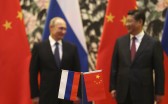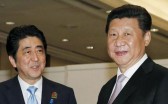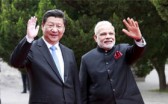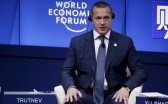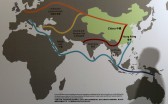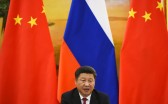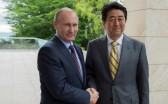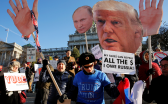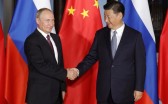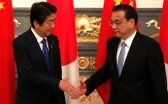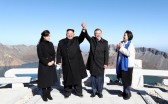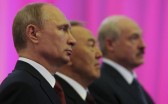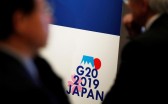China-Russia relations appear to have gained considerable momentum in recent years. A think tank report published this year, co-authored by Russian and Chinese experts, argues that, in the security sphere, “both states have closely approached the line that separates strategic partnership from military-political alliance,” though neither state wishes to cross this line.1 This summer’s events, in the view of some analysts, offer further evidence that China-Russia relations are becoming closer and increasingly significant in world politics.
Russia joined China in condemning the US decision to deploy THAAD in South Korea and arguing that US policy had provoked North Korea. Furthermore, while officially maintaining neutrality on China’s territorial disputes in the South China Sea, Russia seemed to edge closer to China’s position. President Vladimir Putin supported China’s rejection of the ruling by the Permanent Court of Arbitration in The Hague that denied its expansive claims. He backed China’s position that outside powers such as the United States should stay out of these disputes. Russia and China also began joint naval exercises in the South China Sea on Sept. 12.2 “Both sides can carefully avoid the word ‘alliance’,” writes Vasily Kashin, a Russian expert on China, “but this is already something much bigger than ‘good-neighborliness’ or even ‘strategic partnership’.”3
The prospect of a geopolitically significant China-Russia bloc—if not a full alliance, then at least a quasi-alliance involving close political coordination—seems more plausible than it did even a few years ago.4 Nevertheless, the future of this relationship remains uncertain. Western analysts should be alert to the possibility that the relationship could further deepen, but they should also maintain a degree of skepticism about the most expansive claims for its potential. Significant obstacles to a close China-Russia partnership exist at the bilateral, regional, and global levels. A future like the one envisioned in Negative Scenario I is distinctly possible. Viewed through this prism, the most recent progress in China-Russia relations might be less significant than it appears.
Bilateral Economic Ties: A Long Time Coming
Even those who are most bullish about the prospects for China-Russia relations recognize that bilateral economic ties remain underdeveloped. Weak economic ties are not just a possible future scenario for China and Russia, but a current reality. Russia invested great hopes in expanding economic ties with China in order to offset, at least partially, the effect of Western sanctions. However, the decline in China-Russia trade volumes that occurred between 2014 and 2015 continued during the first half of 2016, when bilateral trade fell 5 percent year-on-year to just $28 billion.5 It is true that the contraction of China-Russia trade is mostly a result of low energy prices. It is also true that Russia’s trade with other major partners has suffered similar declines. For example, Russia’s trade with the European Union has fallen each year since 2012 and suffered a sharp drop in 2015.
Nevertheless, China-Russia trade continues to pale in comparison with US-China trade and Russia-EU trade. It is also weighted disproportionately toward natural resources and arms sales. In a negative scenario, even these sectors could stagnate. Construction of the Power of Siberia gas pipeline could experience delays, while the second gas pipeline might become moribund. Russian arms sales to China could decline as China seeks to enhance domestic production. In any case, a significant increase in China-Russia trade will require not only rebounding energy prices, but also a diversification of trade flows.
Other aspects of the economic relationship also remain underdeveloped. Chinese investment in Russia can hardly compensate for its loss of Western capital resulting from sanctions. Cooperation in science and technology also lags. At a conference on China-Russia relations held in Moscow in late May, Russian businessman Viktor Vekselberg said that bilateral cooperation in the sphere of innovation is a “catastrophe.”6
Those who are optimistic about the potential for China-Russia economic cooperation argue that the relationship cannot be built overnight. The effort will require a sustained commitment over many years. This is surely true, but it means that Russia is likely to face continued economic strain in the short run, with unpredictable consequences for domestic political stability. Even in the long run, success is not guaranteed.
In a negative scenario, even a political commitment by both governments to expand economic ties proves insufficient. Lacking sound economic fundamentals, the relationship stagnates. Russia’s continued economic weakness, lack of investment opportunities, and failure to implement economic and bureaucratic reforms reduce its attractiveness to Chinese investors. Meanwhile, China’s economic slowdown limits the supply of capital that is available for investment in Russia. While waiting for economic ties with China to develop, Russia eventually obtains relief from Western sanctions, capitalizing on several EU countries’ weariness with the sanctions regime. This reduces the urgency of attracting Chinese investment.
Even if China and Russia overcome these challenges and steadily expand economic cooperation, their bilateral economic relations are not likely to rival US-China or Russia-EU economic ties in the near future. As long as this remains true, both China and Russia will face economic incentives to limit any potential confrontations with the West. This, in turn, could contribute to a negative scenario by acting as a constraint on the China-Russia strategic partnership.
The Regional Level: Rhetoric Outstrips Substance
One possible interpretation of Putin’s recent comments on the South China Sea is that he has aligned Russia’s policy more closely with China’s. Another possible interpretation is that his words, and even Russia’s participation in the South China Sea naval exercises, merely obscure the reality that Russia remains neutral on China’s maritime disputes.
In a negative scenario, this neutrality could strain China-Russia relations. For example, in a potential crisis involving one or more of China’s territorial disputes in the South China Sea, China might become frustrated if Russia were to offer less than full support. The situation might become especially complicated if it were to involve Vietnam, which has close defense ties with Russia. This tension is apparent in the joint naval exercises. Russia, which sold Kilo-class submarines to Vietnam, is planning to join the PLA Navy in conducting anti-submarine exercises.7
Both China and Russia are primarily focused on their own regions, but neither offers full support for the other’s regional ambitions. China, for example, abstained from a UN Security Council vote that would have condemned Russia’s annexation of Crimea. In one region where the interests of China and Russia intersect, Central Asia, the two countries are cooperating.8 In a negative scenario, this cooperation could break down or at least lose momentum.
In May 2015, China and Russia declared their intention to link China’s Silk Road Economic Belt (SREB) with the Russian-led Eurasian Economic Union (EEU). In a negative scenario, it eventually becomes apparent that this political declaration obscures the difficulties in reconciling the two projects. The EEU is a closed trading bloc, whereas one of China’s goals in the SREB is to create a free trade zone including some of the same countries. Their objectives are in obvious conflict.
For China, the Shanghai Cooperation Organization (SCO) would be an ideal platform for linking the SREB and the EEU.9 However, Russia and the Central Asian countries, concerned about competition from Chinese exports, have resisted a free trade deal with China under the auspices of the SCO. In a negative scenario, this resistance continues. The SCO becomes preoccupied with integrating India and Pakistan as new members, and its importance in Central Asian geopolitics declines. Efforts to link the SREB and EEU focus on infrastructure projects, but economic factors and bureaucratic disputes keep many proposals on paper.
The Global Level: Coordination Problems
In the type of negative scenario envisioned here, it becomes increasingly apparent that China and Russia are pursuing parallel rather than common objectives. Neither country, either alone or in alliance with the other, seeks to challenge the United States for global leadership. Instead, they focus on their own regions, where they carefully probe the limits of US power and commitment.10
This situation eventually could become difficult to manage. On the one hand, both China and Russia could benefit when the other experiences tensions in relations with the United States. Such tensions could offer additional strategic room to maneuver in their own regions. On the other hand, neither has an interest in seeing the other’s relations with the United States deteriorate sharply. In such a situation, the country involved in a crisis might fear that the other would abandon it. The other country, in turn, might fear being dragged into a conflict against its wishes.
Competing approaches to the management of relations with the West were an important factor in the Sino-Soviet split. If the United States and China were to engage in open superpower confrontation, or if US-Russia tensions were to return to Cold War levels, similar factors could once again undermine relations between Beijing and Moscow. Over time, especially if China were to pursue a strongly nationalistic foreign policy, this could push Russia in the West’s direction.
1. Российский Совет по Международным Делам, Российско-китайский диалог: модель 2016, no. 25 (2016): 10.
2. Stephen Blank, “A Crystallizing Russo-Chinese Alliance,” Eurasia Daily Monitor, vol. 13, no. 145, September 9, 2016.
3. Vasily Kashin, “Больше, чем партнерство” [“More than partnership”], Vedomosti, August18, 2016
4. Brian G. Carlson, “China-Russia Relations and the Inertia of History,” Survival: Global Politics and Strategy 58, no. 3 (June/July 2016): 213-222; “Hostility to the US unites Moscow and Beijing,” Financial Times, September 13, 2016.
5. Alexey Eremenko, “Russia-China Economic and Trade Partnership Falters,” NBC News, September 11, 2016, http://www.nbcnews.com/news/world/russia-china-economic-trade-partnership-falters-n645291.
6. Alexander Gabuev, “Правила игры, ” Kommersant, June 3, 2016, http://www.kommersant.ru/doc/2996097
7. Ankit Panda, “Chinese, Russian Navies to Hold 8 Days of Naval Exercises in the South China Sea,” The Diplomat, September 12, 2016.
8. Zhao Huasheng, “中亚:谁的 ‘大游戏?’” Xinjiang University Journal 37, no. 4 (July 2016): 89-99.
9. Li Xin, “丝绸之路经济带对接欧亚经济联盟:共建欧亚共同经济空间,” Dongbeiya Luntan, no. 4 (2016): 60-71.
10. Jakub J. Grygiel and A. Wess Mitchell, The Unquiet Frontier: Rising Rivals, Vulnerable Allies, and the Crisis of American Power (Princeton, NJ: Princeton University Press, 2016).

